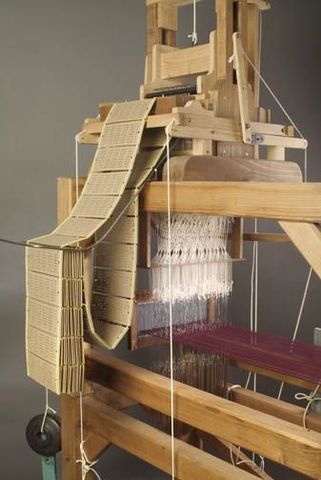Seventh law of worker entropy: Difference between revisions
Amwelladmin (talk | contribs) No edit summary |
Amwelladmin (talk | contribs) No edit summary Tags: Mobile edit Mobile web edit |
||
| (10 intermediate revisions by the same user not shown) | |||
| Line 1: | Line 1: | ||
{{a| | {{a|work| | ||
[[File:Jacquard loom.jpg|450px|thumb|center|An [[jacquard loom|invention]] making life easier, yesterday. Well, in 1804.]] | [[File:Jacquard loom.jpg|450px|thumb|center|An [[jacquard loom|invention]] making life easier, yesterday. Well, in 1804.]] | ||
}}{{seventh law of worker entropy}} | }}{{seventh law of worker entropy}} | ||
In support of the theory, we cite {{author|Peter Thiel}} — who has had the odd small success starting up (and, er, shutting down) innovative internet businesses — whose operating assumption when considering an investment is that to see off competition and have a reasonable chance of success, a tech product should be ''an order of magnitude'' better than its competitors. Not just a ''bit'' better, but ''ten times'' better.<ref>{{br|Zero to One: Notes on Startups, or How to Build the Future}}, {{author|Peter Thiel}}</ref> | |||
And ''definitely'' not ''worse''. | |||
This is little more than an articulation of the following: if you want to change how people do things, ''make it easier for them''. Not ''harder''. | |||
For example, the punched-card-controlled [[Jacquard loom]] (pictured) made life inestimably easier for Parisienne couturiers who fancied intricately woven silken fabrics. The machine took off. Two hundred years later, you are reading this very article on its direct descendant. I dare say M. Jacquard would be as surprised as you are. | |||
So to the inverse: ''any'' “innovation” that, for example, injects a new [[dialog box]] into an existing process, or requires a [[user]] to take some additional action, however well-intended — was there ever a [[dialog box]] that ''wasn’t'' well-intended? — makes life ''harder'', however exciting the prospect of enhanced [[MIS]] that comes from having the [[user]]s repetitively click it may be. | |||
{{sa}} | {{sa}} | ||
| Line 13: | Line 19: | ||
*[[Technological unemployment]] | *[[Technological unemployment]] | ||
{{Ref}} | {{Ref}} | ||
{{c|cosmology}} | |||
{{C|Laws of worker entropy}} | |||
Latest revision as of 23:22, 10 June 2022
|
Office anthropology™

|
The JC’s seventh law of worker entropy states that successful inventions do not make things harder. The JC asserts, without evidence but, he feels, without needing it — for it is an a priori truth as certain as arithmetic or natural selection — there has been no successful innovation in design, commerce or technology in the history of civilisation itself that made life more tedious, difficult, frustrating or inconvenient than it already was.
In support of the theory, we cite Peter Thiel — who has had the odd small success starting up (and, er, shutting down) innovative internet businesses — whose operating assumption when considering an investment is that to see off competition and have a reasonable chance of success, a tech product should be an order of magnitude better than its competitors. Not just a bit better, but ten times better.[1]
And definitely not worse.
This is little more than an articulation of the following: if you want to change how people do things, make it easier for them. Not harder.
For example, the punched-card-controlled Jacquard loom (pictured) made life inestimably easier for Parisienne couturiers who fancied intricately woven silken fabrics. The machine took off. Two hundred years later, you are reading this very article on its direct descendant. I dare say M. Jacquard would be as surprised as you are.
So to the inverse: any “innovation” that, for example, injects a new dialog box into an existing process, or requires a user to take some additional action, however well-intended — was there ever a dialog box that wasn’t well-intended? — makes life harder, however exciting the prospect of enhanced MIS that comes from having the users repetitively click it may be.